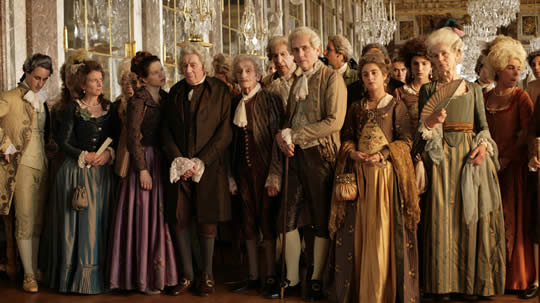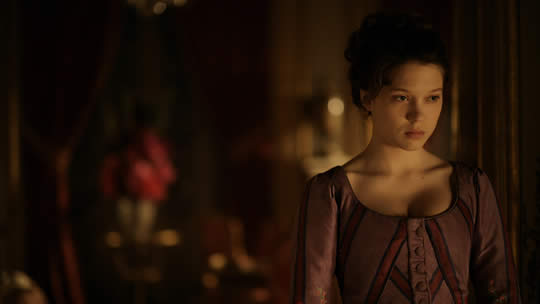 Farewell, My Queen marks the return of acclaimed director Benoît Jacquot (A Single Girl, Seventh Heaven, Sade, Deep in the Woods,) and brilliantly captures the passions, debauchery, occasional glimpses of nobility and ultimately the chaos that engulfed the court of Marie Antoinette in the final days before the full-scale outbreak of the Revolution.
Farewell, My Queen marks the return of acclaimed director Benoît Jacquot (A Single Girl, Seventh Heaven, Sade, Deep in the Woods,) and brilliantly captures the passions, debauchery, occasional glimpses of nobility and ultimately the chaos that engulfed the court of Marie Antoinette in the final days before the full-scale outbreak of the Revolution.
Based on the best-selling novel by Chantal Thomas, the film stars Léa Seydoux as one of Marie’s ladies-in-waiting, seemingly an innocent but quietly working her way into her mistress’s special favors, until history tosses her fate onto a decidedly different path. With the action moving effortlessly from the gilded drawing rooms of the nobles to the back quarters of those who serve them, this is a period film at once accurate and sumptuous in its visual details and modern in its emotions. Diane Kruger’s gives her best performance to date as the ill-fated Queen and Virginie Ledoyen is the Queen’s special friend Gabrielle de Polignac.
Bijan Tehrani: What motivated you to pick up Chantal Thomas’s book, Farewell, My Queen for making your latest film?
Benoit Jacquot: What really interested me is the fact that it takes place in a very concentrated period of time and in a very specific place. I wanted to show this restrictive time period and setting through the perspective of one particular character. In this case the young woman, who is the reader and is actually an older character in the book. From beginning through the very end, we view from her perspective in this environment of catastrophe and panic and experience the feelings and emotions heightened by this.
BT: Farewell, My Queen has a distinct style that seems to transport the audience to this time period. How did you go about developing this style for your film?
BJ: For me, this was an absolutely essential part for shooting this film. You could see what was happening and experience it simultaneously so that it would not come across as a re-creation of the events. The actors and their character portrayals were essential in following through with this principle. I directed them in a way that they were experiencing those events for the first and last time.
BT: How did you conjure the authenticity of the performances? Were the actors kept in the dark about their characters’ futures?
BJ: It was very important for me to keep the actors and actresses from knowing exactly what is happening. So when they arrive on set, their performances deliver as though it is happening for the first time.
BT: To some critics, the actors in Farewell, My Queen might be interpreted for amateurs, but I feel as though you have squeezed fresh performances out of experienced actors.
BJ: The performers did very well. In this case, we were lucky to have talented actors and their performances appeared in a way that was very true, so it give you this feeling of authenticity. This film is a fictional story and you need to have actors that have the skill to embody and portray the characters. If you have amateurs that aren’t able to fulfill the demands of the roles, then you will surely fail; but if you have talented professional actors, they are more likely to blur the line between acting and reality and make you believe in what they are doing.
 BT: How was casting for the film? Specifically, how did you go about casting Lea to play the Queen’s reader?
BT: How was casting for the film? Specifically, how did you go about casting Lea to play the Queen’s reader?
BJ: I wanted an actress who was approximately twenty years old, but I also wanted a twenty year-old who could act. Right now in France, there is a short list of actresses of that caliber; we are speaking of maybe three or four. So I chose Lea—not because she outperforms everyone in that group, but because she represented most clearly and most closely the kind of physical and mental characteristics that I was looking for.
It was very important for me to have a foreign actress play Marie Antoinette, because Marie reigned as an Austrian and she was known as the foreigner. So Diane Kruger and I had a conversation; she spoke in a very convincing way about why she would be able to bring quality to the role and I was convinced. I also asked Virginie Ledoyen, and I considered her because she is somebody that I worked with in two previous films when she was younger.
BT: Except for the last part of Farewell, My Queen, we never leave Versailles. Did you ever attempt writing the screenplay to add something that took place outside Versailles?
BJ: I never thought of going beyond Versailles. It was very important for me to keep the point of view of the reader, and the reader herself never goes outside of Versailles.
BT: The lighting is very interesting, the scenes are seemingly candle-lit; it makes it look more like a  newsreel and also very believable.
newsreel and also very believable.
BJ: It is almost a paradoxal situation because when we think about neutrals, we always think about lighting with electricity. We never think that the lighting can be done by candlelight. It was important to me to imagine what life would have been like at the time without electricity, and that influenced our lighting decisions.
BT: There are a few critics that say that the audience does not get emotionally involved. I think that this is actually an advantage of the film, because it allows us to witness the history and not get too close as to invoke disbelief in the story.
BJ: I am in absolute agreement with you on that.
BT: What is your next project?
BJ: Currently, I’m to start working on a new film for next spring. It’s going to be based on an original screenplay and will be set in a contemporary time period.
BT: Thank you very much for your time, and good luck!

